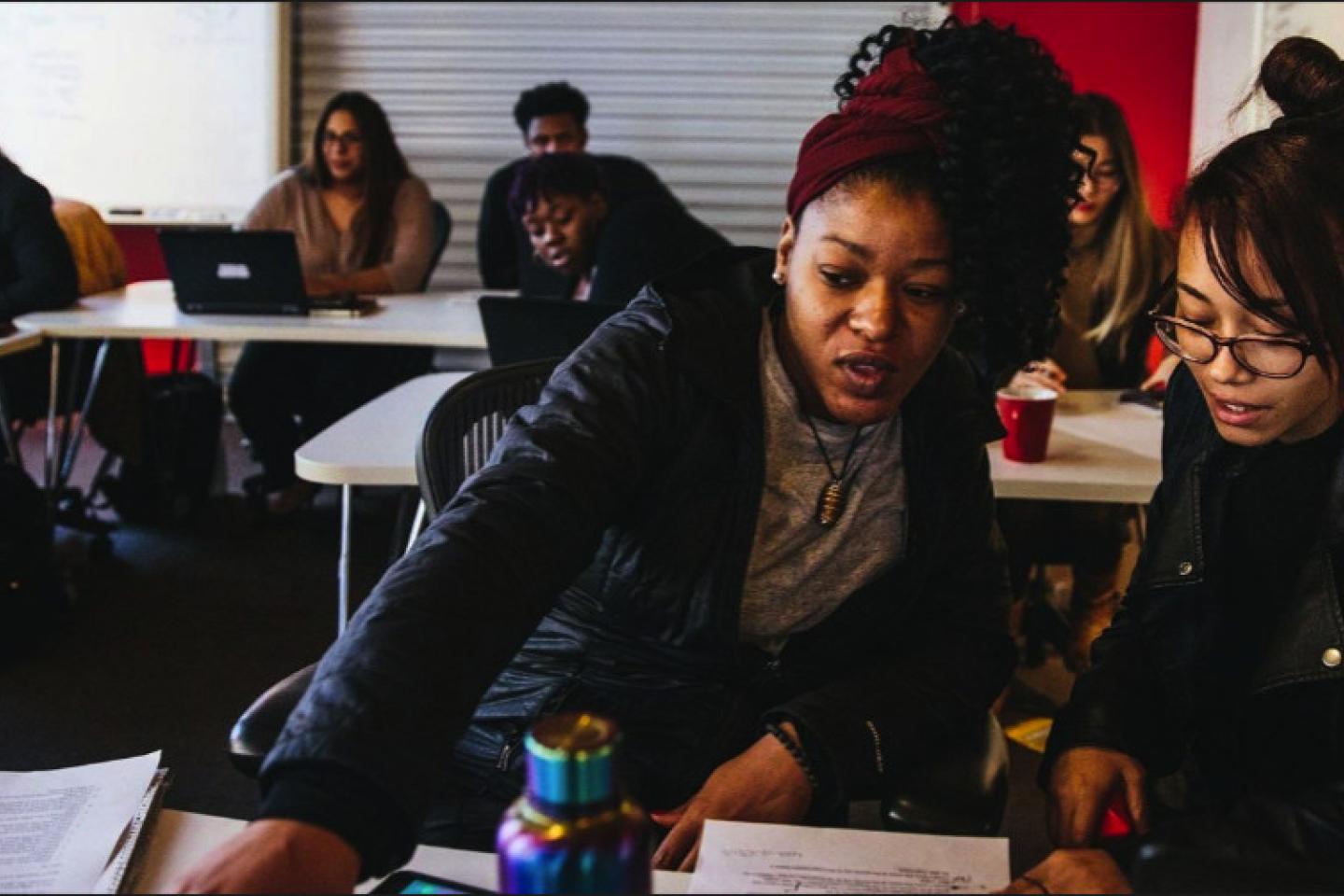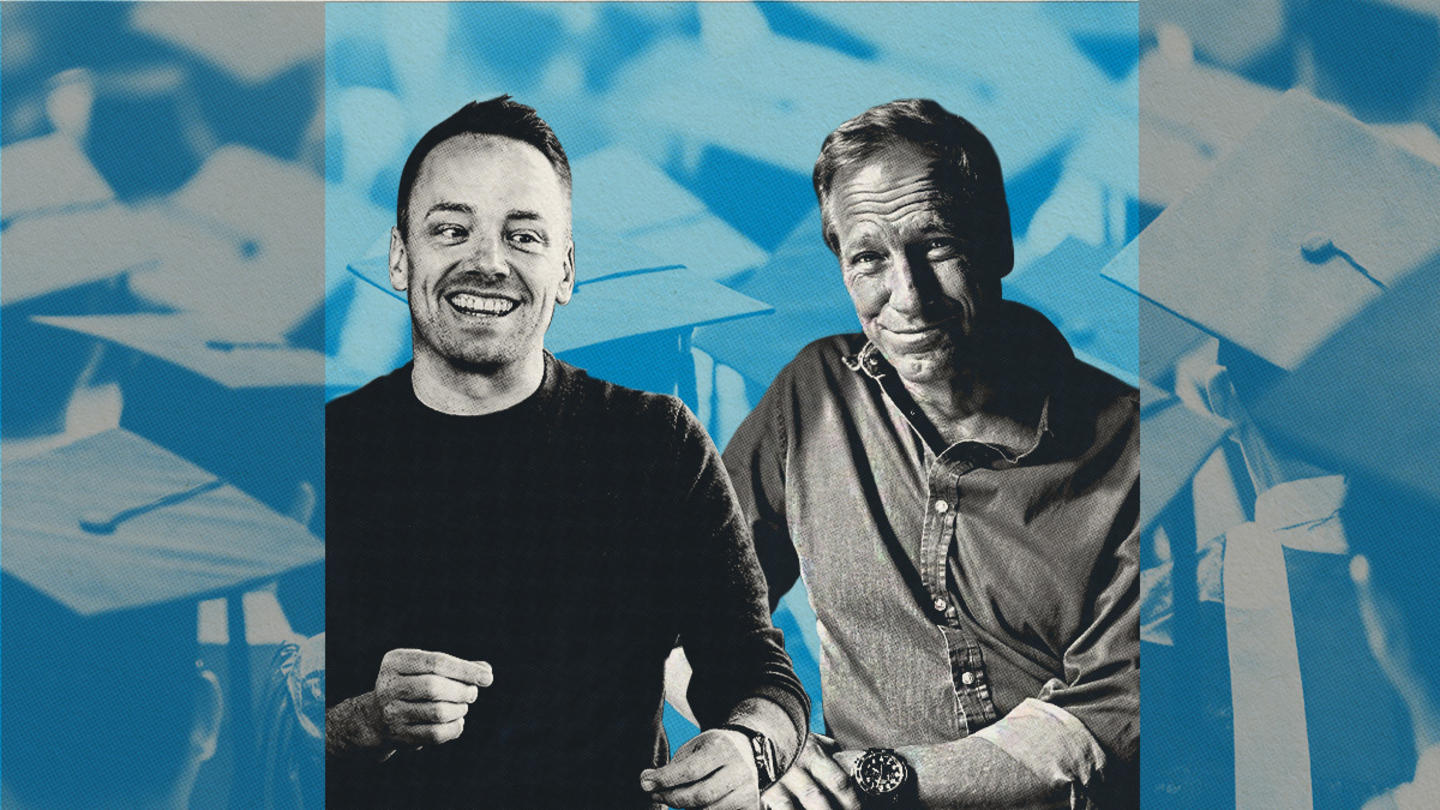It's a cold, gusty morning in downtown Chicago, where Rico Bryant shows up for work every day at a non-descript office building. He buzzes himself in under a small black awning, opens the door, and trots up two steps to press the elevator call button. There is nothing fancy about where he is headed—a third floor loft space on Dearborn Street, one block north of the House of Blues. But when he describes this place he lights up and says, "This is where the magic happens."
Rico is a proud alumni and now the full-time recruitment manager for i.c. stars, a technology-based workforce development and leadership training program for low-income adults. Rico is the talent guy.

Three times a year he pores over 400-500 applications and funnels them through a rigorous selection process that includes a hot-seat panel interview. There are a few standard prerequisites—a minimum age (18), a high school diploma or GED, and six months of cumulative work experience. Beyond that, Rico is looking for resilience and career aspirations. Proof that a candidate has weathered adversity and desires to build a salaried career in technology, and not just an hourly paycheck. The process ends with a class of 20 interns who will embark on a 16-week experience (called a "cycle") that will turn their lives right side up.
Most of these interns have upside down stories. They come from upside down places and are caught in an upside down cycle of oppression and adversity. i.c. stars (short for Inner-City Computer Stars) exists to upend that narrative and create opportunities for employment, leadership and community impact for an overwhelmingly misperceived and oft forgotten group of individuals. They do this through technology education, soft skills coaching, and a uniquely relational workplace culture.
The men and women who are accepted into the program are predominately from low-income, inner-city neighborhoods where few people aspire to become corporate tech pros. Most i.c. stars stories began like that of current intern Tierra Phillips, a young single mom of three who grew up in the infamous Cabrini-Green neighborhood on Chicago's north side.

"I was in low income housing, on public assistance, TANF, food stamps…so I didn't really see my life going anywhere," Tierra recalls.
With no college degree and without a vision for her life, Tierra hopped from one minimum wage job to another, eventually landing a retail position at Verizon, which piqued her interest in IT. When a friend, who also happened to be an alumni, told her about i.c. stars, Tierra decided to look into it. She was drawn to the program because of its emphasis on relationships.
"It was the network I needed to get where I wanted to be," she says, "That's what clicked for me."
Now, only eight weeks in, Tierra is eyeing what she calls a "brighter future". Homeownership, a better education for her children, and a career as a software developer. "Before, I didn't see a future. I didn't see a clear path for me. So being here now, I see where I want to go. I know that I can go there and I have the tools and the resources that i.c. stars provided me to actually get there," she says. "My mind wasn't open to that before because I wasn't exposed to it."



Exposure is a crucial component of i.c. stars. Interns are immersed in a culture of high expectations, bolstered by a low tolerance for excuses. On weekdays they arrive at 8AM, and their calendar is full until they leave at 8PM. They can't arrive late. They can't leave early. They must adhere to a strict, business casual dress code. If they ever violate one of these standards, they're asked to leave the program.
The 12-hour days are not for the faint of heart. Interns spend most of their time working in teams to create technology products for high-profile clients. They're building data systems and mobile apps. They're building relationships and resumes. They're building confidence and community. The days are arduous, and interns do receive a $200 weekly stipend, but the intrinsic rewards are immeasurable.
When the elevator opens on the third floor, you step right into the action. There is no "front desk", no receptionist. A lounge area complete with earth-toned couches surrounds a coffee table, and an open garage door behind the couches reveals what appears to be a board meeting in progress. A couple dozen people sitting around a piecemealed conference table made of several modern, white desks on wheels. This space overlooking a busy downtown street is called the Learning Studio. It's where the interns are having their morning meeting with their program manager, Paige. Everyone in attendance is intent, focused, and pleased to be there.
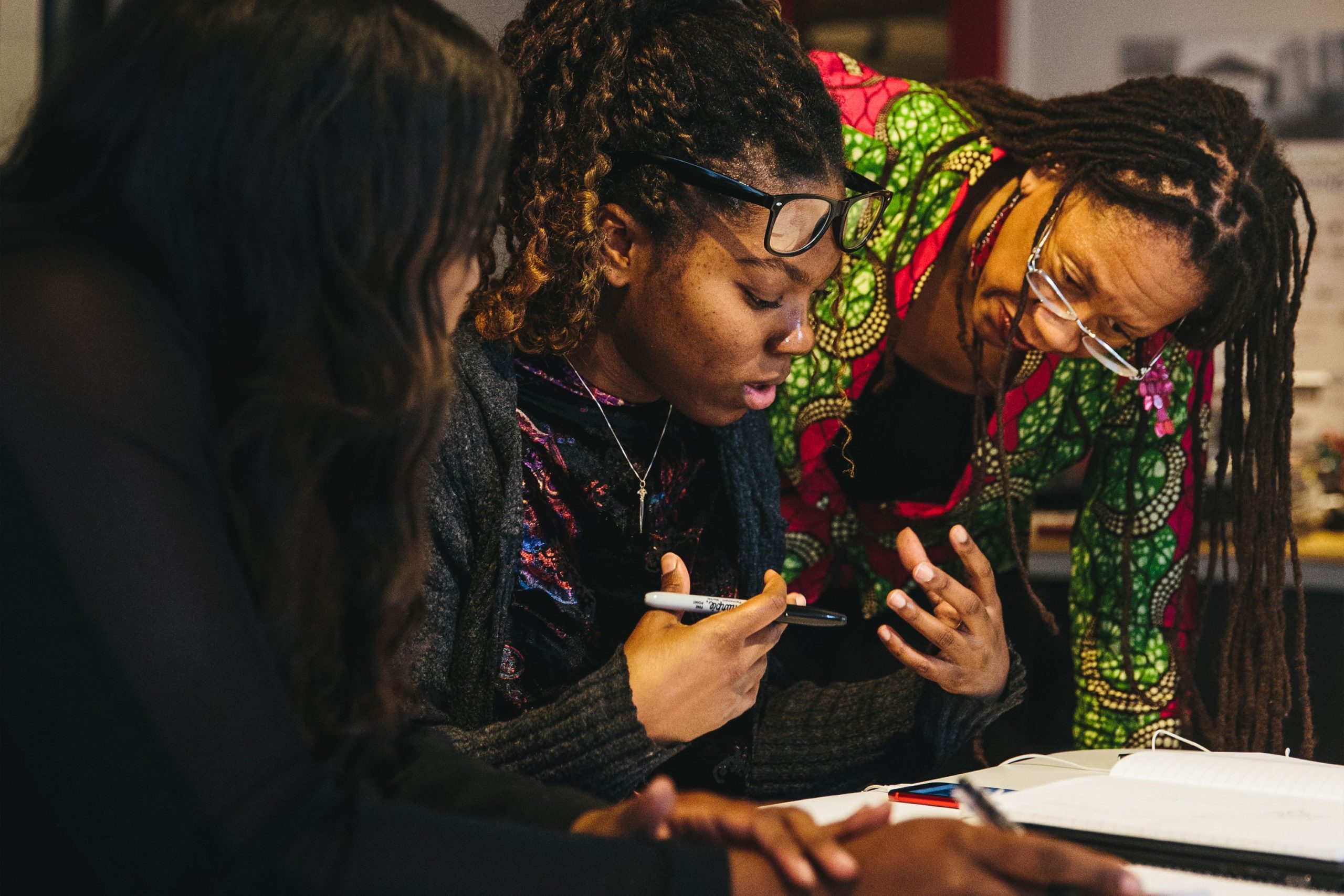
Around the corner there is a door that leads into the i.c. stars office space. Hanging on the wall just inside is a framed 90s desktop computer keyboard that has been dipped in gold paint. This is a small sign of the i.c. stars magic. The keyboard hangs in homage to its original owner, one of the first employees who created the company's initial IT framework. He is no longer with the organization, but his influence is still being honored.
A tour of the small loft-like office space will leave no one guessing about the feng shui there. It feels like home. The largest common space is an open, full kitchen where coffee is brewing and a several people are mingling. Even the bathrooms are in on it, with nature sounds playing and motivational quotes plastered all over the walls. The centerpiece of the entire space is a fishbowl conference room where a few people are gathered around, deep in discussion. A peek into a small side office reveals a massage chair where a masseuse spends one day each quarter doing deep tissue work on any wanting staff.
There is an overwhelming sense that everyone at i.c. stars is being cared for, and this is not lost on the interns who, though they are here to work, receive a heavy dose of something deeper. Jason Kidd, who joined the current "cycle" three days late after being waitlisted, calls it love.
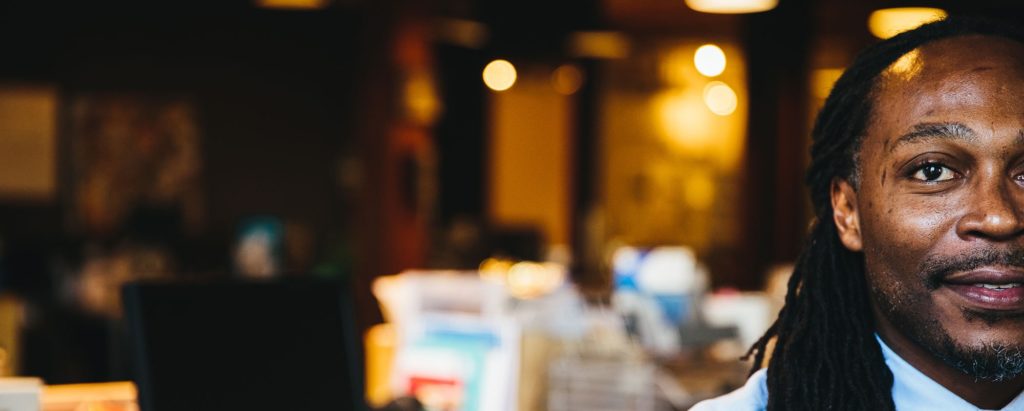
Love
"You feel it permeate every room. It's love, man," says Jason. "They love everything about what they're doing. They love everything about their mission. They love the people that they bring onto their team. Everything about it is love."
Jason is 35 years old. His smile is electric and every word he speaks oozes with the joy of a man who has finally found his way. Raised by a single mother in a poverty-stricken south suburb of Chicago, Jason was a good student until he made a mistake at age 18 that cost him the next 17 years of life. After being released from prison this past spring, he moved into a halfway house and started looking for work.
"You're in a situation where they're telling you all you can do is drive a forklift for the rest of your life. All you can do is work on construction sites for the rest of your life, so you don't even believe something like this is possible," he says.
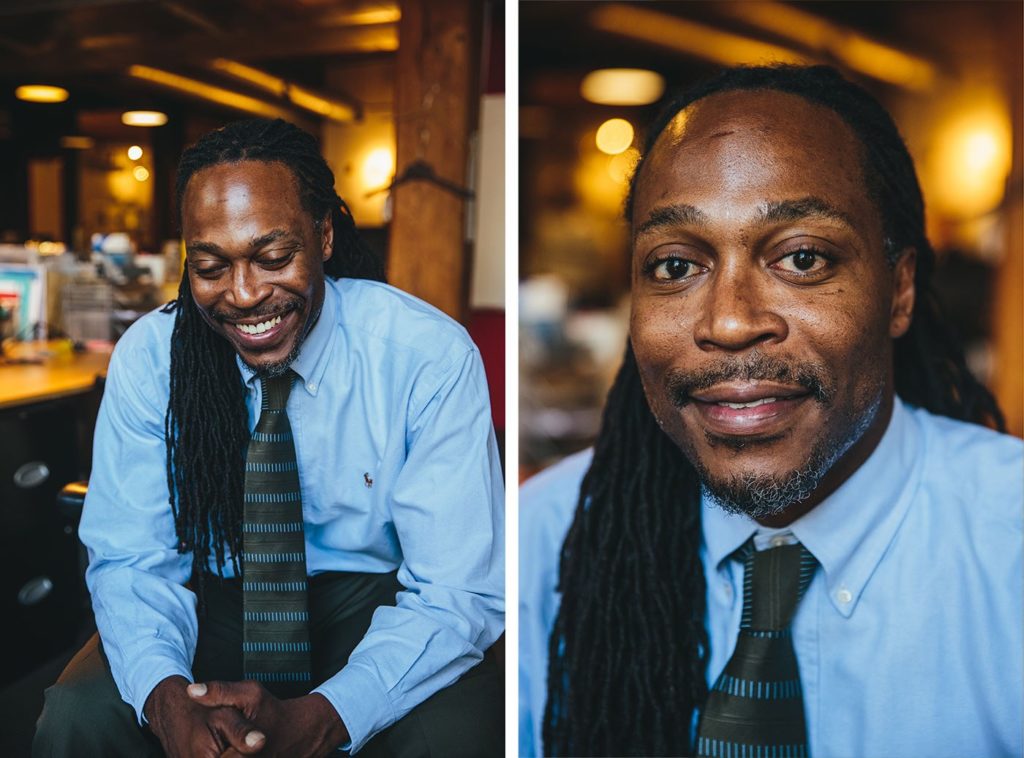
When a housemate consistently came home in a shirt and tie, Jason became curious and asked him where he worked. He excitedly told Jason about his experience at i.c. stars, and Jason applied right away. The program requirements were outside of the halfway house parameters for employment (strict hours, no laptops allowed in the house, etc.), but Jason says the i.c. stars staff fought for him and eventually received approval.
Jason's team is working on an artificial intelligence project, building robotic process automation for a leading tech company. As technical analyst, it's his job to develop the processes.
"I've always been interested in tech, but through life circumstances, I've never had the opportunity. And they gave me an opportunity to pursue it and it's been incredible," Jason says. "I'm not from the background that a normal technical analysts would be from, but they've given me a chance and I'm trying to make the most of it while I'm here."
Jason is one of two ex-offenders in this cycle. He calls i.c. stars a "fantasy world" to most people coming out of prison, but this experience is opening his eyes and his heart to create opportunities like this for others.
"There are a lot of good people that want to come home and do right. If you bring more men of color and let them know that these opportunities are out there, it'll impact our communities."
Jason Kidd, Intern, i.c.stars
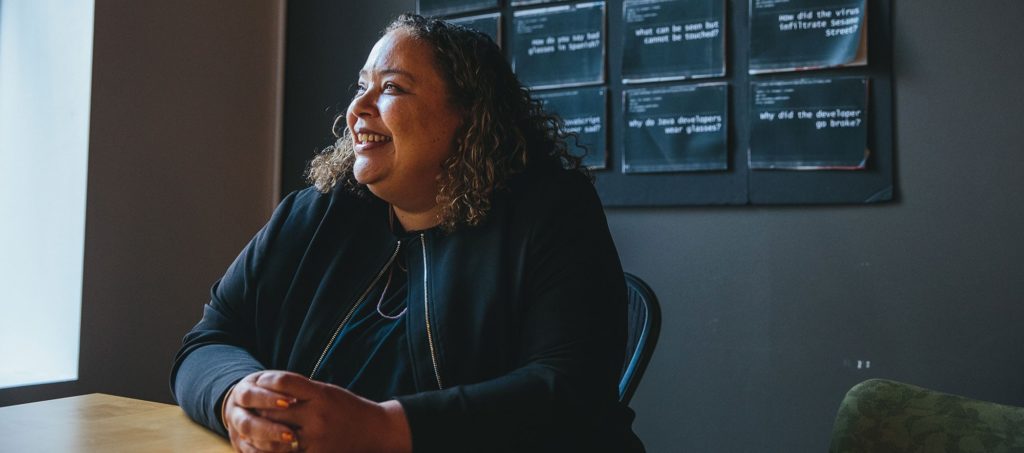
Cycle of opportunity
Community impact is the crux of the i.c. stars model, which hinges itself on reversing what co-founder and CEO, Sandee Kastrul, calls the "cycle of opportunity". It's a cycle that she has witnessed repeat itself for decades, like an echo in a dark, hallow cavern. And if that dark place is Chicago's inner-city, Sandee Kastrul is a bright light that darkness will have to reckon with.
When she walks into a room, her magnanimous personality fills every space and simultaneously leaves room for everyone else to be seen and heard. Around the office, her warmth and optimism has earned her the honorary title of Chief Hope Officer, while her gentle directness is why she's sometimes called the Snuggly Dictator.
"She really respects authenticity and wants people to find their voice," says Chief Revenue Officer, Elizabeth Ferruelo. When Sandee comes up in conversation, students, staff, and alumni use words like creative, inspiring, and servant leadership. Transparent, encouraging, and wisdom get tossed around as well.
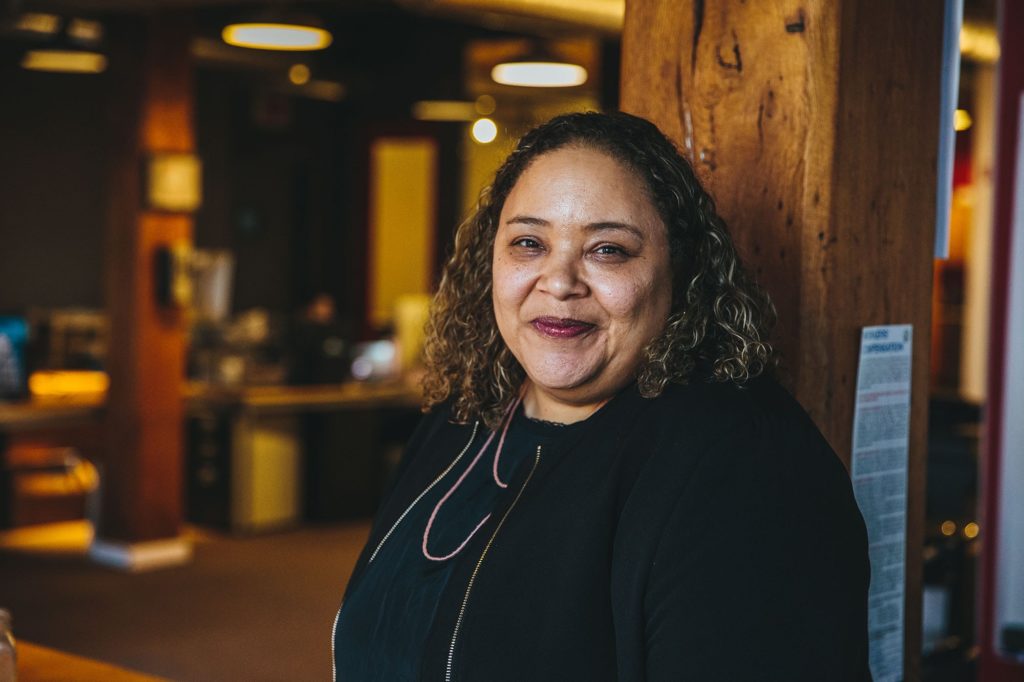
Growing up in the Rogers Park neighborhood on the north side of Chicago, one of the most diverse neighborhoods in the country, Sandee Kastrul is no stranger to the mixed bag of opportunity that comes with living in a big city like Chicago.
"From a very early age, I had to learn how to walk between worlds in a way that was very different than someone coming from a community that was homogenous," she says.
A graduate of a performing arts high school, Sandee says that theatre saved her life by keeping her off the streets and into something she cared deeply about. She then went on to receive her BFA in theater. After working for several theatre companies during the arts education movement of the 1980s and 90s, Sandee parlayed her theatre experience into a K-12 teaching career that she says birthed a love for personal transformation through learning. She used her theatre background to breathe fresh life into math and science classrooms, using algebra and chemical reactions to teach students about freedom and relationships. It was there that she discovered something that would lead her into her truest calling.
"The thing I realized was that the kids who had the least amount of resources were the most resilient," she remembers with awe, as if she's just noticed it for the first time again.
Sandee took this revelation and ran with it, using it to develop a one-of-a-kind curriculum, and launch i.c. stars in 2000, at the height of the tech boom.
"The more adversity we face, the more resilient we are. And we developed this toolkit that has…the critical thinking, the creativity, the reciprocity, the hutzpah. i.c. stars is providing context to unpack [all these things]."
Sandee Kastrul, Co-founder and CEO
Mid-thought, she stands up, grabs a marker, and starts writing on the white board. She diagrams the "cycle of opportunity" and explains the i.c. stars strategy for reversing it. That cycle looks like this: Societal oppression creates a lack of opportunity. That lack of opportunity paralyzes personal ambition. This, coupled with unfair civic policies, creates more systemic oppression, thus creating an even greater lack of opportunity. And the cycle continues.
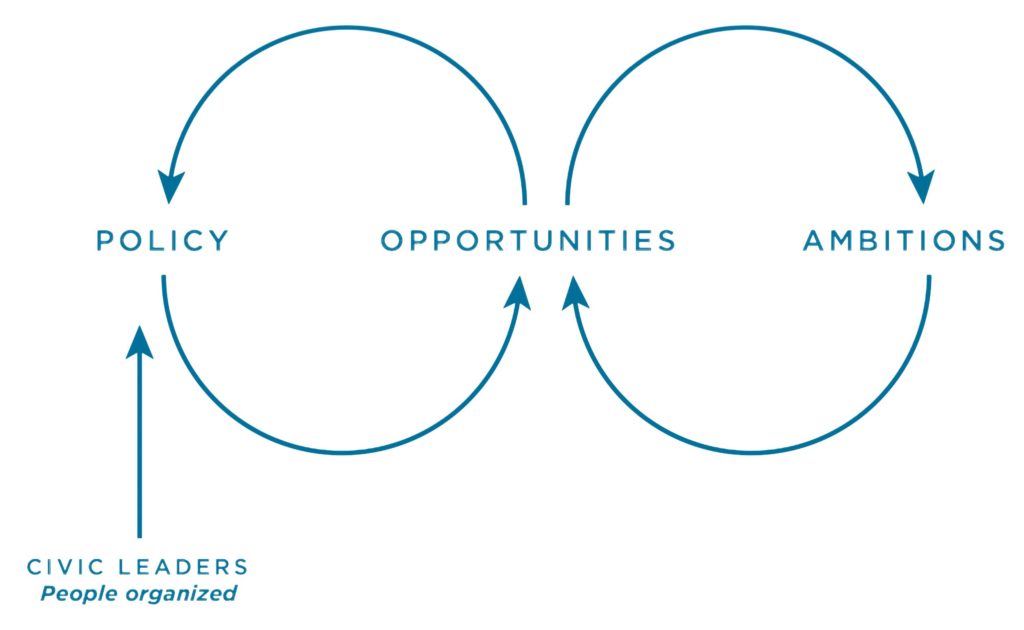
In Chicago, Sandee sees two cities. A place where, depending on what neighborhood you live in, the cycle of opportunity flows swiftly in one direction of the other. There is no middle ground.
"There's a lot of really messed up stuff in our city right now. And I think it centers around this notion of oppression," she laments. "We have extreme poverty. And then we have crazy innovation and opportunity, and they couldn't be more disconnected."

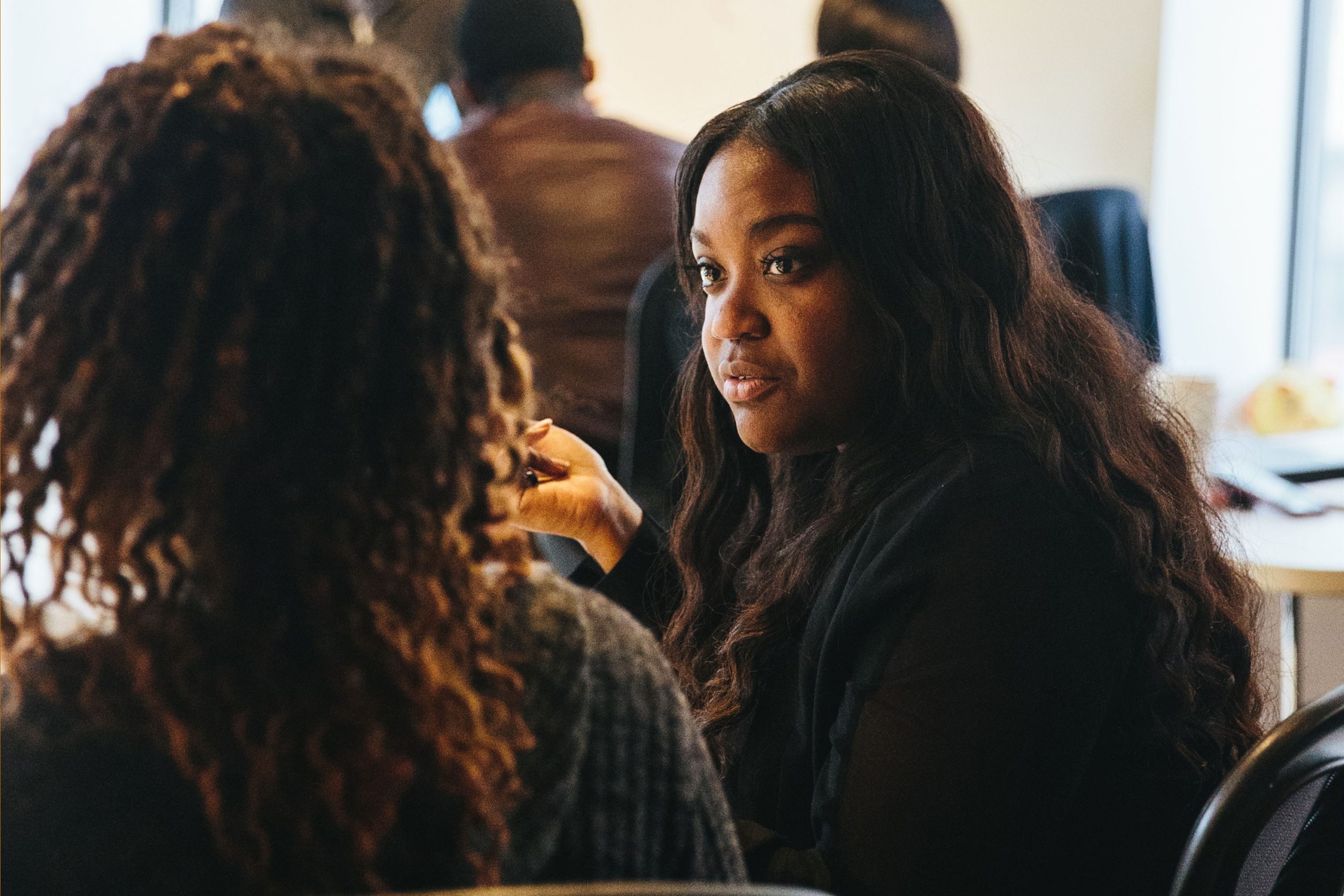

i.c. stars finds people who have been through the storms of poverty and introduces them to the world of innovation and opportunity. Sandee calls it "walking between worlds." Through project-based, professional skills training through IT content and community-focused leadership development, i.c. stars is changing the data and crushing long-held misconceptions about the inner-city demographic—proactively creating a new cycle of opportunity in the tech industry.
Adam Hecktman, a Microsoft Philanthropies executive, has been a volunteer for i.c. stars since the first intern cycle. He recounts one particular intern named Kevin who came into the program in 2000 at the age of 20. Kevin did not have a high school degree, but he was intelligent, compassionate and innovative, which caught Adam's eye right away.
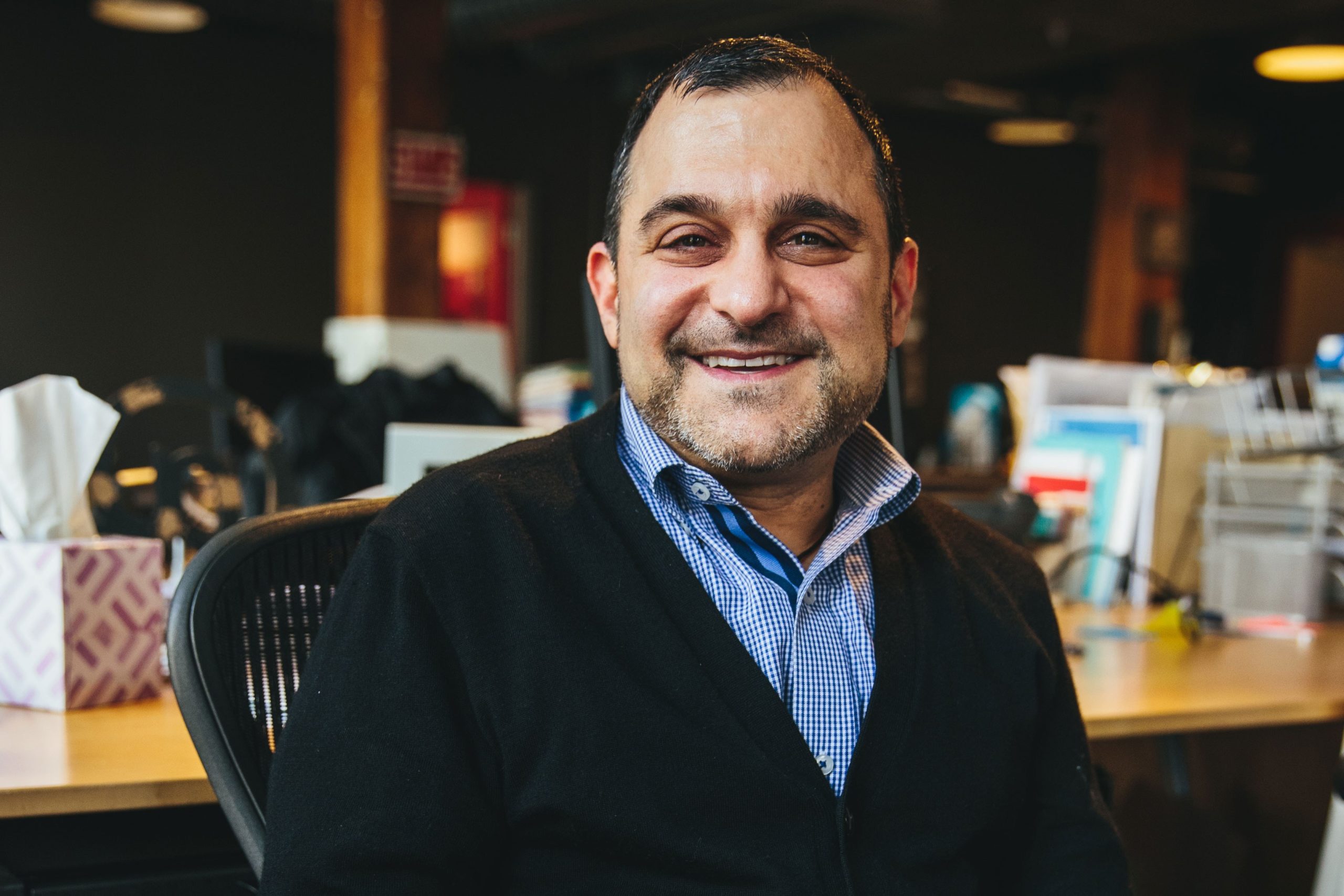
"Before Kevin even graduated, I said 'I need to have him.' Sandee said 'Well, you're going to have to compete for him, because there's going to be a lot of companies that are going to want this guy.'"
In the end, Adam did hire Kevin, and 18 years later he is still working for Microsoft as a principal cloud architect. He owns a home in the Dunning neighborhood on Chicago's northwest side where he lives with his wife, son, and two Audis.
"He is always looking for who's going to be the next Kevin. And that next Kevin always is going to come out of i.c. stars," Adam asserts.
His experience with i.c. stars as both an advocate and potential employer has given him a unique perspective. He sees first-hand the employment obstacles that many people from under-resourced communities face, even after they graduate from i.c. stars.
"We've got to change the formula," he says. "The college degree is sort of the default screening mechanism, but what we're seeing is that a lot of companies are starting to shift and rewrite job descriptions and this is exciting for us."
He's seen companies like Accenture get creative by making new pathways for i.c. stars talent to be hired without a degree, serving as interns before being promoted to full-time positions. As more companies have adopted this strategy, i.c. stars has leveraged these relationships and built a strong reputation in Chicago. A business model that is mutually beneficial.
"For Microsoft, I believe that it's not just good corporate social responsibility to support programs like i.c. stars, it's existential."
Adam Hecktman, Microsoft Philanthropies Executive
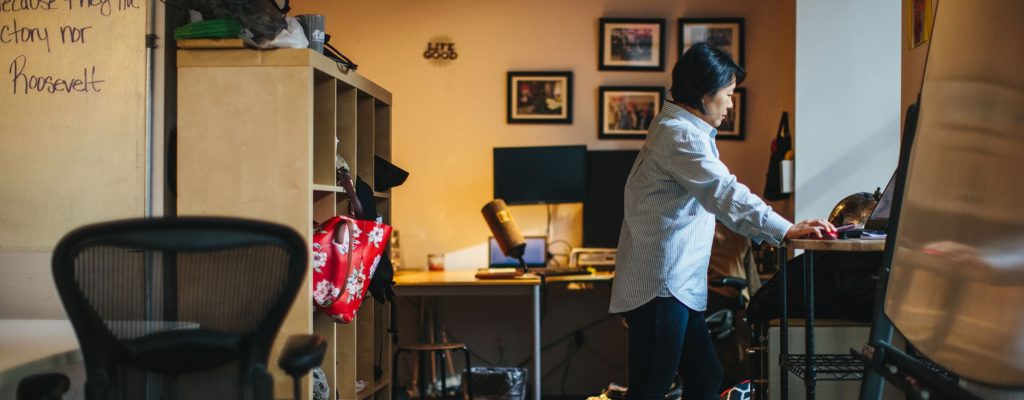
The end game
The i.c. stars end game isn't just to churn out expert coders, it's to build community leaders. Civic leaders, business leaders, and service leaders who go back home and create change. In a very real sense, i.c. stars is a leadership college disguised as a tech bootcamp. And its alumni are poking holes in glass ceilings, bringing new hope to their neighborhoods, and slowly but surely reversing that cycle of opportunity.
Tierra Phillips says that before coming to i.c. stars her goal was to make it out of her neighborhood, describing it as a "terrible" place to live. But the program's emphasis on community impact has changed her perspective.
"I can take the skills that I've learned here and take that back to my community," she says, smiling as she talks about the i.c. stars civics class. "They're actually teaching us how to reach out to our alderman. I never knew who my alderman was. So now I actually know how to take the steps to being a civic leader. Going into my neighborhood and making changes."

Sixty-five members of the i.c. stars Alumni Association are homeowners. Once receiving public assistance, they're now buying homes in the low-income communities they were raised in. Fifty-four members are business-owners, hiring employees from within their under-served communities. Others are working for Fortune 500 companies like Microsoft, Siemens, and Accenture, in full-time technology positions.
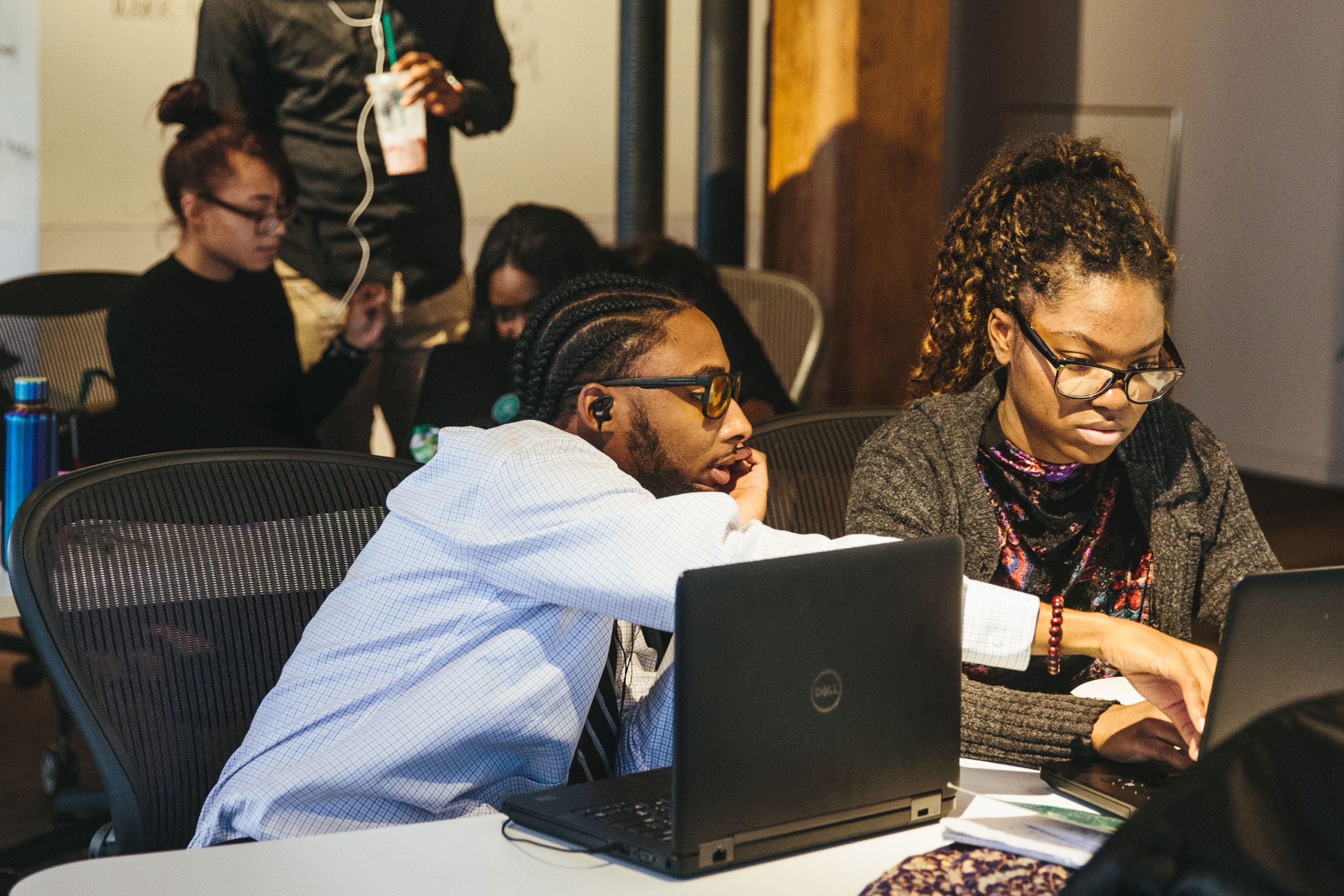
i.c. stars has trained over 450 people in technology, leadership and business, with an 81 percent retention rate, a 90 percent job placement rate, and a 300 percent average earnings increase.
Yes, those statistics are unprecedented. But what gets Sandee out of bed each morning are the people, their stories, and their potential for social impact in their communities.
She takes her seat again and begins to muse:
"What if we were solving problems and building solutions that work within our systems, but then also solving problems and building some solutions in our communities. And using systems thinking to change our communities ourselves instead of waiting for other people to come in and do it."
Sandee Kastrul, Co-Founder and CEO
i.c. stars is on a mission to train and mobilize 1,000 community leaders. People who will not only gain footholds in a high-demand technology industry, but also return to their communities as teachers, mentors, and entrepreneurs, creating opportunities for the next generation of leaders. But this is not just a Chicago dream. There are already fully-operational i.c. stars cohorts in Milwaukee and Columbus, OH, with Kansas City, Buffalo, and Oakland in close view. They've found the program model is easily transferable to smaller midwestern cities, but there are plans to expand into metro areas as well.

"We need an i.c. stars in every city and every state, because it works if you work it, so that's the next big thing," says CRO Elizabeth Ferruelo. "Two weeks ago we had folks from Mexico here who have been in contact with Sandee and they were observing the model."
Ferruelo says that so far, their expansion is teaching them the model is not a 100 percent carbon copy. "It is 80% here are the playbooks, here's the operational piece. But there is this localization that should be part of the model and I think needs to be part of the model to really fit the challenges that the community is facing, and best fit into the existing ecosystem," she explains. "What are the specific needs that the tech employers are facing and feeling, and how can we grow into that and train the talent that they need."

Becoming best versions
Amber Williams, an alumni from 2014's spring cycle, runs her photography business out of the i.c. stars offices. Last year she started working at the Cook County jail in the mental health transition center where she volunteered to teach photography as a skill that could generate income when offenders are released. But she became aware of another need and her plans changed. She realized that ex-offenders experience many challenges when they re-enter society. In Jason Kidd's words, "Unless you have an incredible support system, you're going to have challenges, challenges, challenges, because you don't know how to do basic things."
Ambers goal is to replicate i.c. stars within prison walls to prepare people for tech careers before they're even released.
"I want to do kind of what I do here, where I'm teaching prototyping or I'm teaching them about user experience design," she says. "That's a way to get you looking at the bigger things that you can do. You can get into these tech spaces. Even if you have a [correctional] background."
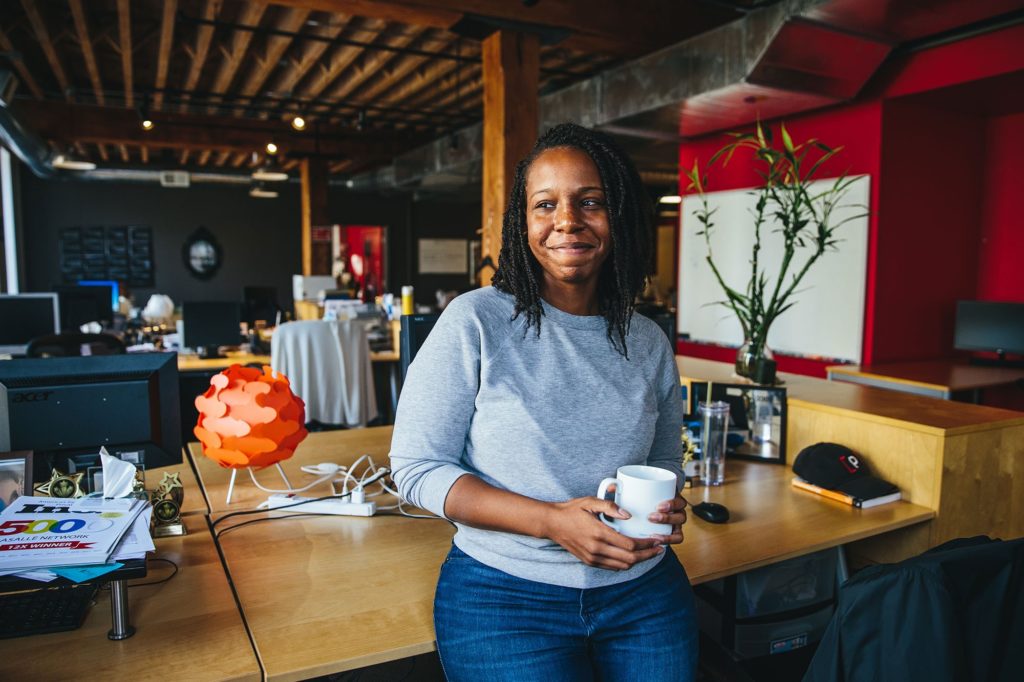
Amber embodies the true magic of i.c. stars. The paradigm-shifting, perspective-changing vision that goes beyond the curriculum. Hand-picking young adults from overlooked places, recognizing their underestimated potential, and giving them an opportunity to become the best version of themselves.
One way this plays out in the office is the daily practice of "high tea". It's part of what Sandee calls their "gift giving" curriculum. Every day at 4PM, everything stops and the interns gather around the table in the Learning Studio. A top-level tech executive joins them, sharing their story over a pot of tea.
"But there are some rules like you can't pour your own tea, and you can't talk about yourself," Sandee gleefully informs me. "So I would pour your tea and introduce you, [and] we go around in a circle. You have to get used to every day, someone saying something nice about you."

High tea is a transformational element of the i.c. stars culture, for both the interns and the executives that come in, breaking down barriers and redefining misconceptions.
"People think, 'I'm coming to help the inner-city folks.' And really, we're helping them," says Sandee.
Around the tea table, interns are asked to share their fears, their fights, their passions, and their legacies. Everyone shares, no one can interrupt, and everyone learns to listen. It's etiquette with a splash of vulnerability. It's such a powerful hour that graduates of the program, called residents, often show up for high tea.
Residency is the 20-month phase after interns complete their cycle. Residents work full-time in tech positions while still receiving resources and support from i.c. stars. Ernest Roberts, currently a year into his residency, often joins the group for tea.
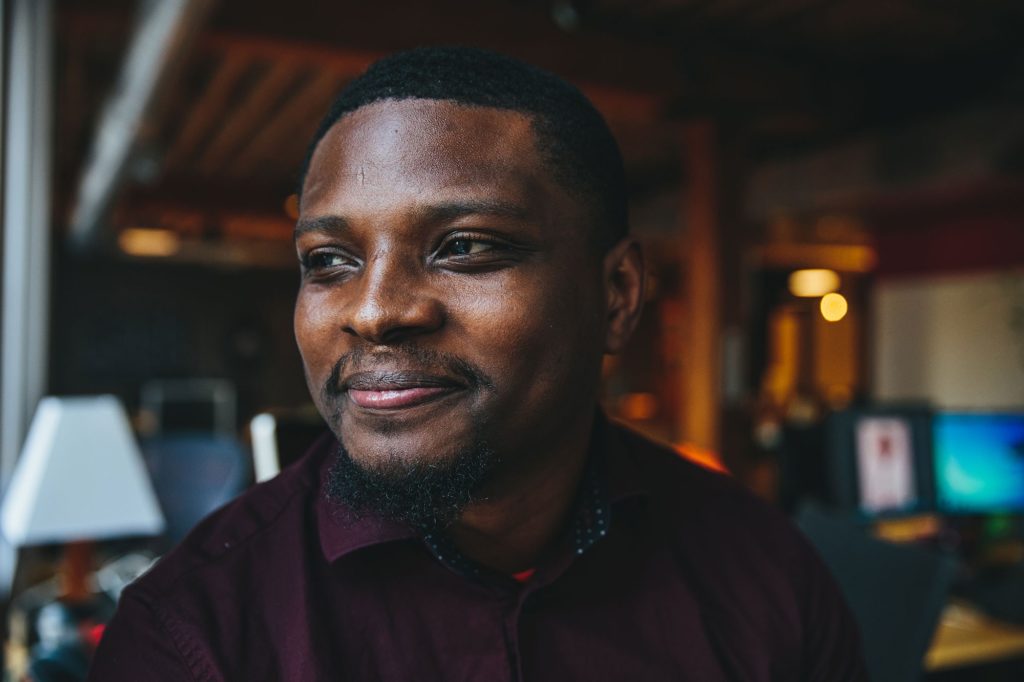
Ernest works full-time as a software engineer at Options Clearing Corporation , a Chicago-based equity clearing house. He's also one of the founders of the i.c. stars Alumni Association.
"Everybody that comes out of this program is considered a leader because that's what we build you up to be. You don't necessarily have to be in the tech field, but you're going to be a leader in your community. You take back everything that you've learned…and you get to go create opportunities for others and really become a leader in any industry all because of the teachings that Sandee created."
Ernest Roberts, Resident, i.c.stars
Demetrius King, almost a year into his i.c. stars residency, also spends a lot of time in the office. He is currently on staff at Cloudbakers, a cloud migration firm. To describe what's happening at i.c. stars in one word, he says "revolution."
He expounds on his word choice with this: "They're taking people that society has pushed aside. They're teaching them the skills and the mindset to be a force in this world. They're starting a revolution."
"They're taking people that society has pushed aside. They're teaching them the skills and the mindset to be a force in this world. They're starting a revolution."
That revolution, stirring up in a small loft space just north of the Chicago River, is not about technology or business or careers. Though these are some of the sparks that fly, the i.c. stars revolution is all about the people.
"The secret sauce is us," Rico says. "That's the magic at i.c. stars."
The name i.c. stars is more than a play on words. Where much of society sees black holes of oppression and a lack of opportunity, Sandee Kastrul truly sees stars. Talented, intelligent, and passionate leaders who are defying stigmas, changing perceptions and transforming communities a one cycle at a time
"This company is theirs. And I mean that on every level. If we exist, they have community. And really, my job is the custodian. I'll make sure the lights stay on for their legacy, not mine."
Sandee Kastrul, Co-Founder and CEO
***
Learn more about Stand Together's efforts to make the economy work for all and explore ways you can partner with us.
